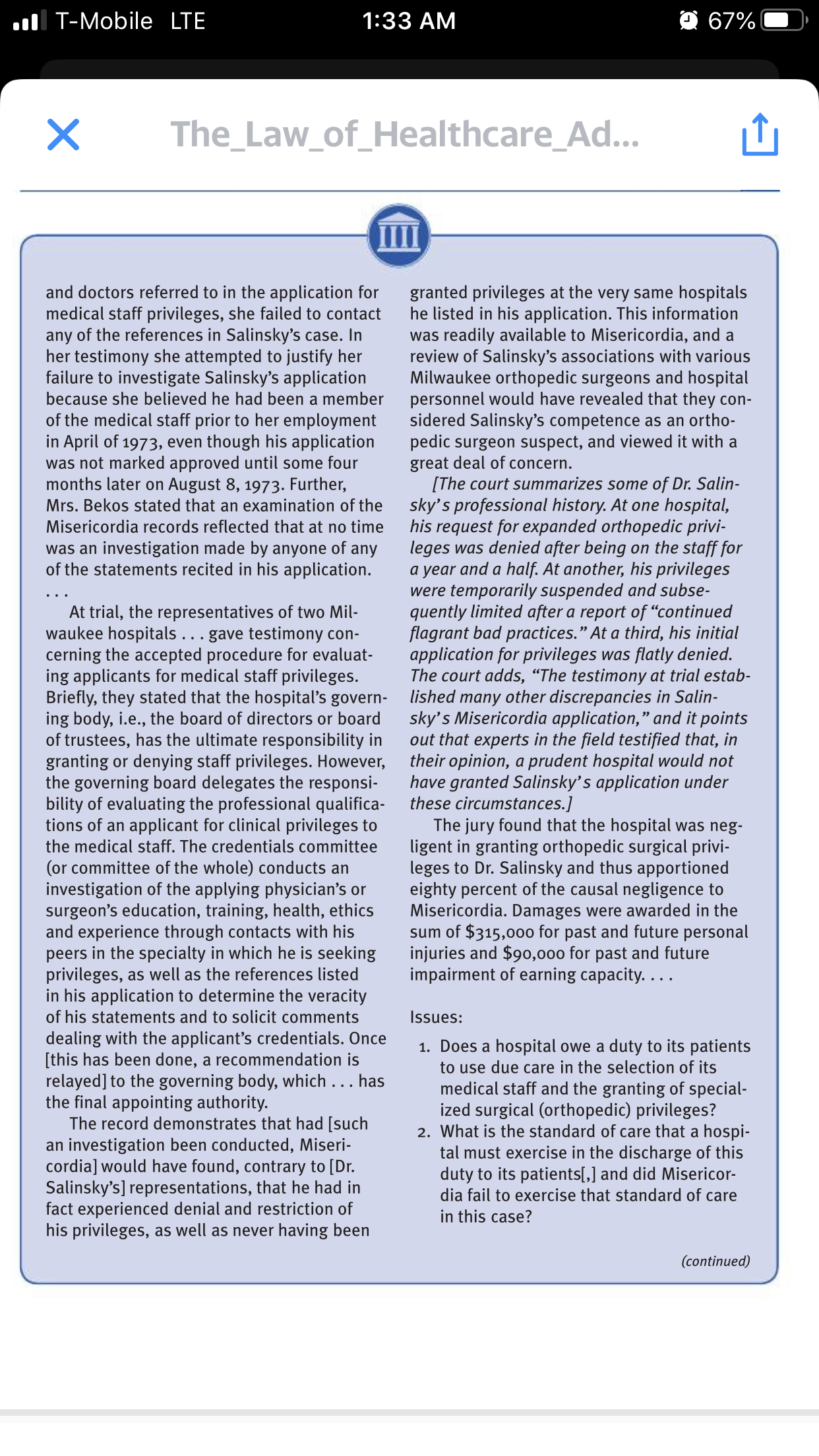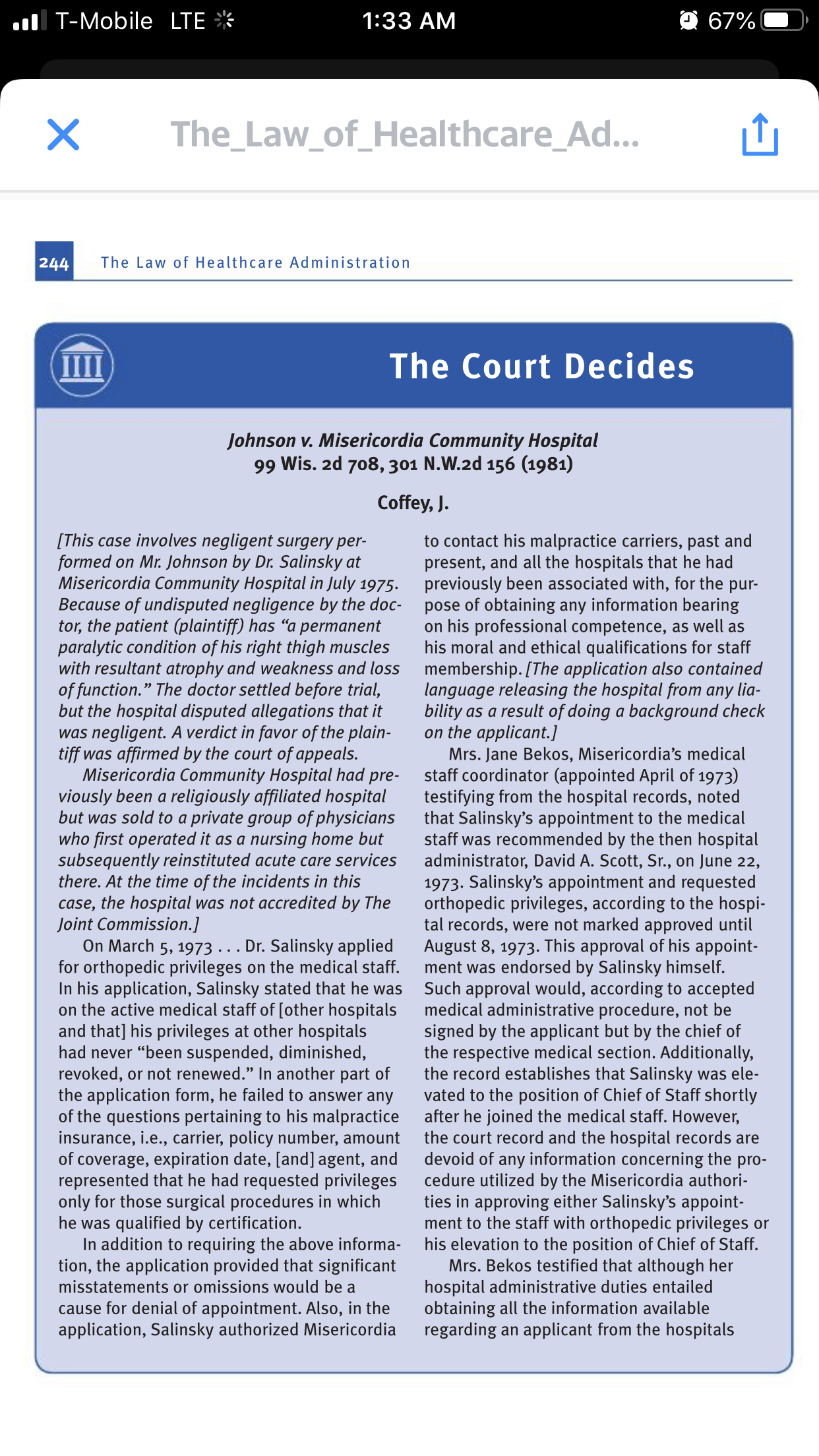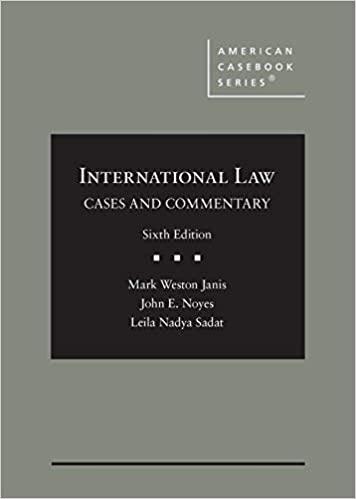From the case shown below, Do you agree with the court's rationale? What would have been the implications of the
opposite result?
3. Do you agree with the court's statement on how the public perceives a modern hospital
today? What evidence is there to support this statement?
4. Does this decision mean that a hospital will be liable for every incident of malpractice
committed by nonemployee members of its medical staff? Why or why not?
.II TMobile LTE and doctors referred to in the application for medical staff privileges, she failed to contact any of the references in Salinsky's case. In hertestimony she attempted to justify her failure to investigate Salinsky's application because she believed he had been a member ofthe medical staff prior to her employment in April of 1973, even though his application was not marked approved until some four months later on August 8, 1973. Further, Mrs. Bekos stated that an examination of the Misericordia records reected that at no time was an investigation made by anyone of any of the statements recited in his application. At trial, the representatives of two Mil- waukee hospitals . . . gave testimony con- cerning the accepted procedure for evaluat- ing applicants for medical staff privileges. Briefly, they stated that the hospital's govern- ing body, i.e.. the board of directors or board of trustees, has the ultimate responsibility in granting or denying staff privileges. However, the governing board delegates the responsi- bility of evaluating the professional qualica- tions of an applicant for clinical privileges to the medical staff. The credentials committee (or committee of the whole) conducts an investigation of the applying physician's or surgeon's education, training, health, ethics and experience through contacts with his peers in the specialty in which he is seeking privileges, as well as the references listed in his application to determine the veracity of his statements and to solicit comments dealing with the applicant's credentials. Once [this has been done, a recommendation is relayed] to the governing body, which . . . has the nal appointing authority. The record demonstrates that had [such an investigation been conducted, Miseri- cordia] would have found, contrary to [Dr. Salinsky's] representations, that he had in fact experienced denial and restriction of his privileges, as well as never having been 367%- granted privileges at the very same hospitals he listed in his application. This information was readily available to Misericordia, and a review of Salinsky's associations with various Milwaukee orthopedic surgeons and hospital personnel would have revealed that they con- sidered Salinsky's competence as an ortho- pedic surgeon suspect, and viewed it with a great deal of concern. [ The court summarizes some of Dr. Salin- sky's professional history. At one hospital, his request for expanded orthopedic privi- leges was denied after being on the sta' for a year and a half. At another; his privileges were temporarily suspended and subse- quently limited after a report of \"continued agrant bad practices. \"At a third, his initial application for privileges was atly denied. The court adds, \"The testimony at trial estab- lished many other discrepancies in Salin sky's Misericordia application, \" and it points out that experts in the eld testied that, in their opinion, a prudent hospital would not have granted Salinsky's application under these circumstances. } The jury found that the hospital was neg- ligent in granting orthopedic surgical privi- leges to Dr. Salinsky and thus apportioned eighty percent of the causal negligence to Misericordia. Damages were awarded in the sum of $315,000 for past and future personal injuries and $90,000 for past and future impairment of earning capacity. . . . Issues: 1. Does a hospital owe a duty to its patients to use due care in the selection of its medical staff and the granting of special- ized surgical (orthopedic) privileges? . What is the standard of care that a hospi- tal must exercise in the discharge of this duty to its patients[,] and did Misericor dia fail to exercise that standard of care in this case? (continued) all T-Mobile LTE ** 1:33 AM 67% X The_Law_of_Healthcare_Ad... 244 The Law of Healthcare Administration IIII The Court Decides Johnson v. Misericordia Community Hospital 99 Wis. 2d 708, 301 N.W.2d 156 (1981) Coffey, J. [ This case involves negligent surgery per- to contact his malpractice carriers, past and formed on Mr. Johnson by Dr. Salinsky at present, and all the hospitals that he had Misericordia Community Hospital in July 1975. previously been associated with, for the pur- Because of undisputed negligence by the doc- pose of obtaining any information bearing tor, the patient (plaintiff) has "a permanent on his professional competence, as well as paralytic condition of his right thigh muscles his moral and ethical qualifications for staff with resultant atrophy and weakness and loss membership. [The application also contained of function." The doctor settled before trial, language releasing the hospital from any lia- but the hospital disputed allegations that it bility as a result of doing a background check was negligent. A verdict in favor of the plain- on the applicant.] tiff was affirmed by the court of appeals. Mrs. Jane Bekos, Misericordia's medical Misericordia Community Hospital had pre- viously been a religiously affiliated hospital staff coordinator (appointed April of 1973) but was sold to a private group of physicians testifying from the hospital records, noted that Salinsky's appointment to the medical who first operated it as a nursing home but staff was recommended by the then hospital subsequently reinstituted acute care services there. At the time of the incidents in this administrator, David A. Scott, Sr., on June 22 case, the hospital was not accredited by The 1973. Salinsky's appointment and requested orthopedic privileges, according to the hospi- Joint Commission.] tal records, were not marked approved until On March 5, 1973 . . . Dr. Salinsky applied August 8, 1973. This approval of his appoint- for orthopedic privileges on the medical staff. ment was endorsed by Salinsky himself. In his application, Salinsky stated that he was Such approval would, according to accepted on the active medical staff of [other hospitals medical administrative procedure, not be and that] his privileges at other hospitals signed by the applicant but by the chief of had never "been suspended, diminished, the respective medical section. Additionally, revoked, or not renewed." In another part of the record establishes that Salinsky was ele- the application form, he failed to answer any vated to the position of Chief of Staff shortly of the questions pertaining to his malpractice after he joined the medical staff. However, insurance, i.e., carrier, policy number, amount the court record and the hospital records are of coverage, expiration date, [and] agent, and devoid of any information concerning the pro- represented that he had requested privileges cedure utilized by the Misericordia authori- only for those surgical procedures in which ties in approving either Salinsky's appoint- he was qualified by certification. ment to the staff with orthopedic privileges or In addition to requiring the above informa- his elevation to the position of Chief of Staff. tion, the application provided that significant Mrs. Bekos testified that although her misstatements or omissions would be a hospital administrative duties entailed cause for denial of appointment. Also, in the obtaining all the information available application, Salinsky authorized Misericordia regarding an applicant from the hospitals








